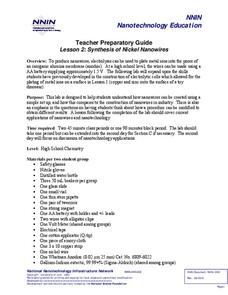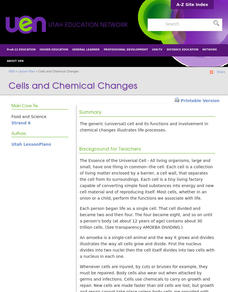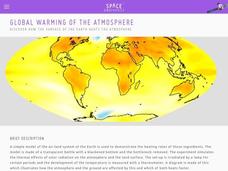National Nanotechnology Infrastructure Network
Synthesis of Nickel Nanowires
It's all about the scale—they're not just wires, they're nanowires! The second lesson plan of the series builds on the oxidation-reduction experiment in the first lesson plan. Scholars synthesize a sample of nanowires using electrolysis....
Curated OER
Cells and Chemical Changes
The billions of cells that make up all living things are the focus of this resource. Understanding the differences between the cells that make up plants and animals is an important distinction; it is covered here quite-well. Some...
Curated OER
Alka-Seltzer Cannons
The scientific method is emphasized in this engaging and exciting chemistry lesson. Learners get to create Alka-Seltzer cannons out of film cannisters, water, and Alka-Seltzer tablets. Carbon dioxide gas builds up inside the cannister,...
Curated OER
"Easter" Egg Genetics
Using plastic Easter eggs to represent parent phenotypes, genetics enthusiasts simulate the passing of alleles. They record the phenotype of each half of the egg, one representing the mother's and one representing the father's. They...
Curated OER
Make Your Own Paper
Young scholars create their own paper from recycled products. Students describe the steps of the paper-making process, then practice making their own.
Curated OER
Gumdrop Crystal Models
A great way to learn about molecular structures is to make a model. Gumdrops and toothpicks are used to construct crystal models. The models are based on theories of crystal shapes that occur because of positive and or negatively charged...
Curated OER
Lab Tests, Results, and Sulfuric Acid
You may want to change the title of this chemistry PowerPoint to "Identifying Compounds in the Laboratory." Individual slides explain tests that can be performed to confirm what element you have: carbon dioxide, carbonates, and metal...
Curated OER
Following Instructions
Get scholars thinking about the scientific process with this fun experiment they can do at home. Learners practice reading directions as they underline each instruction in a procedural paragraph. They create a flow chart and record what...
Education Outside
Honey Tasting
Young scientists will be abuzz as they sample and compare the tasty treats produced by Apis Mellifera.
Curated OER
Teaching About Plate Tectonics and Faulting Using Foam Models
Young scientists learn about plate tectonics and the three different types of faults (normal, reverse, and strike-slip) using foam models. The activity also covers common types of locations where these faults are found.
Jefferson Lab
Optics: Mirrors and Lenses
Did you see that or did I imagine it? Optical illusions are often created with mirrors and lenses, and here is a presentation that covers many different types of mirrors and lenses and how they work. Flat, concave, and convex mirrors, as...
American Chemical Society
Using Dissolving to Identify an Unknown
There is a solvent called aqua regis that can dissolve gold! After observing a solubility demonstration, groups receive four known crystals and one unknown. Based on the demo, they design an experiment to determine the identity of the...
Space Awareness
Global Warming of the Atmosphere
Scientists know the amount of carbon dioxide in the atmosphere today is higher than at any point in the last 800,000 years. Scholars learn about the amount of thermic radiation absorbed by air and what happens to the rest of the...
Biology Junction
Plasma Membrane – Gateway to the Cell
Just as skin covers your body limiting what can go in and out, plasma membranes cover cells to do the same. Scholars begin with a presentation that gives overview of the structure and function of plasma membranes. Then, they learn how...
Biology Junction
Plant Diversity
Ginkgo trees existed for more than 350 million years, and, at this time, only one species still remains. While plant diversity generally increases over geologic time, some interesting exceptions occur. Young scientists learn about plant...
American Museum of Natural History
Thinking in the Three Dimensions
Discover different dimensions with paper folding. Pupils first read about zero, one, two, and three dimensions, and then learn about the fourth dimension, time. They then use origami to create models of shapes in three dimensions and use...
Curated OER
Levers: Catapults
Students construct a catapult that shoots a cotton ball at least two meters using Legos, rubber bands, and plastic spoons. They discuss how the catapult works, and identify any problems they had with their experiment.
Curated OER
Catapult Unit
Students understand the need for carefully defining the problem before searching for a solution. They understand the need for carefully defining the problem before searching for a solution. Students compare a variety of catapults and the...
Curated OER
Bioplastics
Students define bioplastics and identify its uses. In this bioplastics lesson, students compare and contrast styrofoam to starch peanuts after careful examination. Students understand what biodegradeable means.
Curated OER
Who Is It?/Who Done It?
Students conduct an experiment that allows them to assess individual differences in random DNA sequences and apply those differences when solving a forensic problem. After discussing the polymerase chain reaction and its use to identify...
Curated OER
Paper Towel Testing
Students discuss whether there are variations in absorbency and wet strength amount different brands of paper towels. They compare advertising claims and personal preferences and perform tests to reach a conclusion of which brand is the...
Curated OER
Glacier Dynamics
Students create flubber glaciers. In this glacier dynamics lesson, students experiment factors that may affect glacier speed. Factors include slope, ice temperature, and basal conditions. Students develop hypothesis, conduct experiment,...
Curated OER
Graphing Made Easy
Fourth graders discover the appropriate way to construct and analyze bar, line, picto, and circle graphs. They set up frequency tables and perform some statistical analysis (mean, median, and mode) on their data.
Curated OER
Welcome To Program A Simple Program in C
Students are introduced to the language in C programming. In groups, they determine the correct function to be used and practice running the program to achieve the desired results. They end the lesson by programming more difficult...

























